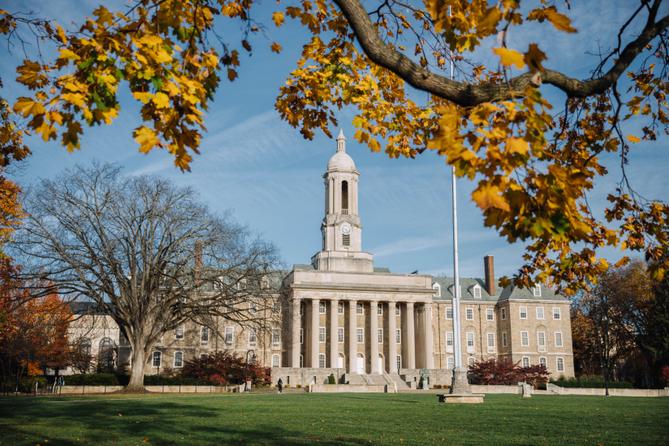This story was produced by the State College regional bureau of Spotlight PA, an independent, nonpartisan newsroom dedicated to investigative and public-service journalism for Pennsylvania. Sign up for our regional newsletter, Talk of the Town.
BELLEFONTE — Spotlight PA today sued the Penn State Board of Trustees over what the newsroom contends are violations of Pennsylvania’s open meetings law.
The lawsuit asks a Centre County judge to determine whether the board and its committees misused exceptions to the state’s Sunshine Act to potentially conduct public business behind closed doors on Nov. 9 and 10.
Paula Knudsen Burke, a lawyer for the Reporters Committee for Freedom of the Press, filed the lawsuit on behalf of Spotlight PA in the Centre County Court of Common Pleas. Burke previously sent the university a letter requesting that it comply with the law as required.
“By regularly meeting in secret, Penn State officials are not just violating the state’s Sunshine Act, they are also violating the public's trust. In order to hold an institution as large and influential as Penn State accountable, we must demand greater transparency,” Burke said of the lawsuit.
The university could not be reached by phone or email for comment.
The filing alleges that the board did not publicly state why its Audit and Risk Committee held two executive sessions Nov. 9 — one before its public meeting, which lasted less than 10 minutes, and one after. The law requires that an organization state during a public meeting why it met in executive session based on any of several legal justifications.
The next morning, the full Board of Trustees was scheduled to meet for more than four hours in “conference and/or privileged executive session,” according to the board’s calendar. A “conference” and an “executive session” have separate legal definitions and applications for governing bodies.
On the morning of Nov. 10, a Penn State board employee told a Spotlight PA reporter the board was meeting in “conference.” That afternoon, during the full board’s public meeting, board chair Matthew Schuyler said the board had met that morning in “executive session.”
Schuyler said the board met to discuss “various privileged matters,” and offered no specific explanation for the executive session.
“We do not take legal action lightly, but we have unfortunately exhausted all other avenues on behalf of the people of Pennsylvania — and especially those who care about the well-being of Penn State — to ensure the university’s Board of Trustees complies with the state open meetings law,” said Christopher Baxter, Spotlight PA president and CEO. “Spotlight PA will never relent in its mission to demand accountability and transparency from powerful institutions, especially when they benefit from taxpayer dollars.”
Spotlight PA has spent the past 16 months documenting a potential pattern of improperly closed meetings by the Board of Trustees and its executive committee spanning more than a decade.
The newsroom’s reporting found that university leadership met privately with trustees to discuss Penn State’s multimillion-dollar budget deficit, as well as the previous administration’s diversity plan. Internal board communications, obtained by Spotlight PA, revealed that board leadership directed trustees to ask questions during a private session rather than at a public meeting, a request a media law attorney described as a “gigantic red flag.”
The newsroom, in partnership with Reporters Committee for Freedom of the Press, sent a letter Oct. 26 to Penn State requesting the Board of Trustees “immediately cease holding improper executive sessions and conferences, advertise and record meeting minutes for all public meetings, and halt the practice of deliberating in secret.”
The university’s vice president and general counsel, Tabitha Oman, replied Nov. 9 and said she was “confident that the Board has taken its official actions and conducted its deliberations in compliance with the Act.”
“We continuously review the Board’s and the University’s planning and communications, remain mindful of our obligations under the Act and will continue to operate in compliance with such obligations,” Oman said.
The Penn State Board of Trustees is scheduled to meet next in February 2024.
SUPPORT THIS JOURNALISM and help us reinvigorate local news in north-central Pennsylvania at spotlightpa.org/donate/statecollege. Spotlight PA is funded by foundations and readers like you who are committed to accountability and public-service journalism that gets results.
